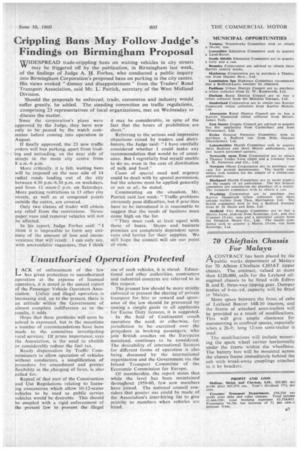Unauthorized Operation Protected
Page 41

If you've noticed an error in this article please click here to report it so we can fix it.
LACK of enforcement of the law has given protection to unauthorized operation at the expense of licensed operators, it is stated in the annual report of the Passenger Vehicle Operators Association. Unfair and illegal operation, is increasing and, uo to the present, there is art attitude within the Government of almost complete indifference as to the results, it adds.
Hope that these problems will soon be solved is expressed, but in the meantime a number of recommendations have been made to the committee investigating rural services. Of prime importance, says the Association, is the need to abolish or considerably reduce the fuel tax.
Ready dispensation by Traffic Commissioners to allow operation of vehicles without conductors, a simplification of procedure for amendment and greater flexibility in the ,charging of fares, is also called for.
Repeal of that part of the Construction and Use Regulations relating to licensing concessions which allow 10-12-seater vehicles to be used as public service vehicles would be desirable. This should he coupled with a rigid enforcement of the present law to prevent the illegal use of such vehicles, it is stated. Educational and other authorities, contractors and industrial concerns are referred to in this respect.
The present law should be more strictly enforced to prevent the sharing of private transport for hire or reward and ignorance of the law should be prevented by issuing a simple guide to all applicants for Excise Day licences, it is suggested.
In the field of Continental coach operation the need, or otherwise, for jurisdiction to be exercised over the procedure in booking passengers, who join British coaches on the European mainland, continues to be considered. The desirability of international licences for different forms of operation is also being discussed by the international organization and the Government via the Inland Transport Committee of the Economic Commission for Europe.
Of membership, the report states that while the level has been maintained throughout 1959-60, few new members have joined. The national council considers that greater use could be made of the Association's inter-hiring list to give priority to members when vehicles are hired.




















































































































































